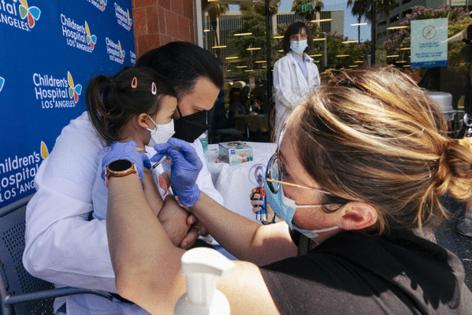COVID shots for kids still recommended by US pediatric group in break with CDC
Published in News & Features
The American Academy of Pediatrics updated its recommendations for immunizations Tuesday, including calling for COVID shots for healthy kids, diverging from controversial advice from the federal government.
The group said it recommends the COVID shot for children ages 6 months to 23 months. Earlier this year, Health and Human Services Secretary Robert F. Kennedy Jr. changed advice that had been in place since the pandemic, saying healthy kids and pregnant women should not receive the vaccine.
AAP has released its own recommendations since the 1930s. This year, the group broke from the U.S. Centers for Disease Control and Prevention after Kennedy replaced the members of an influential vaccine panel with people who have spread misinformation around vaccines. The revamped Advisory Committee on Immunization Practices — or ACIP — said it would reevaluate the childhood immunization schedule at a meeting in June.
Kennedy’s moves around vaccines have raised concern among public health experts, who have warned lifesaving shots could become harder to access. In response, medical groups have taken additional steps to publicize their vaccine guidelines and have urged insurers to cover shots they recommend.
“The AAP will continue to provide recommendations for immunizations that are rooted in science and are in the best interest of the health of infants, children and adolescents,” AAP President Susan Kressly said in a statement.
HHS spokesman Andrew Nixon said in response to the new schedule that the group “is undermining national immunization policymaking with baseless political attacks.” He added it should remove “conflict-of-interest safeguards and keep its publications free from financial influence,” without further elaborating.
AAP said it had no conflicts of interest and has been making vaccine recommendations longer than ACIP has existed.
In May, the CDC updated its website to say healthy children “may receive COVID-19 vaccination, informed by the clinical judgment of a health-care provider.” Previously, it recommended everyone 6 months or older get vaccinated.
In its schedule, AAP also removed a hepatitis vaccine that is no longer available, and recommended children under 8 months old receive the RSV vaccine. It called for influenza shots for children as young as 6 months ahead of the flu season. Kids between 9 to 12 years old should receive the human papillomavirus vaccine, up from the previous recommendation of a starting dose at 11 years, according to the new guidelines.
The changes in vaccination schedules comes as confusion mounts for parents. ACIP decides which shots will be covered by insurance companies or federally funded through the Vaccines for Children Program. By breaking with ACIP, questions remain on which shots will be covered by insurance or readily available in clinics.
“The AAP urges every insurer to cover all the vaccines that are included in this immunization schedule,” Kressly said.
A new group formed after Kennedy revamped ACIP is also trying to guide which shots are recommended. The Vaccine Integrity Project, led by University of Minnesota researchers and public health officials, gathered existing data on vaccines for COVID, RSV and flu shots and presented their findings on Tuesday to professional societies, such as AAP, to help the organizations to develop their schedules.
There are limitations in the data that the researchers were able to analyze. The Vaccine Integrity Project wasn’t able to look at unpublished vaccine trial data or ongoing trials, and only analyzed data presented to ACIP in the past or peer reviewed, published literature. The group found no safety concerns over pregnant women taking the COVID vaccine and that the shot was effective in preventing hospitalizations for children.
Jake Scott, an infectious disease specialist at Stanford University, said the group’s work is ongoing.
_____
©2025 Bloomberg L.P. Visit bloomberg.com. Distributed by Tribune Content Agency, LLC.







Comments